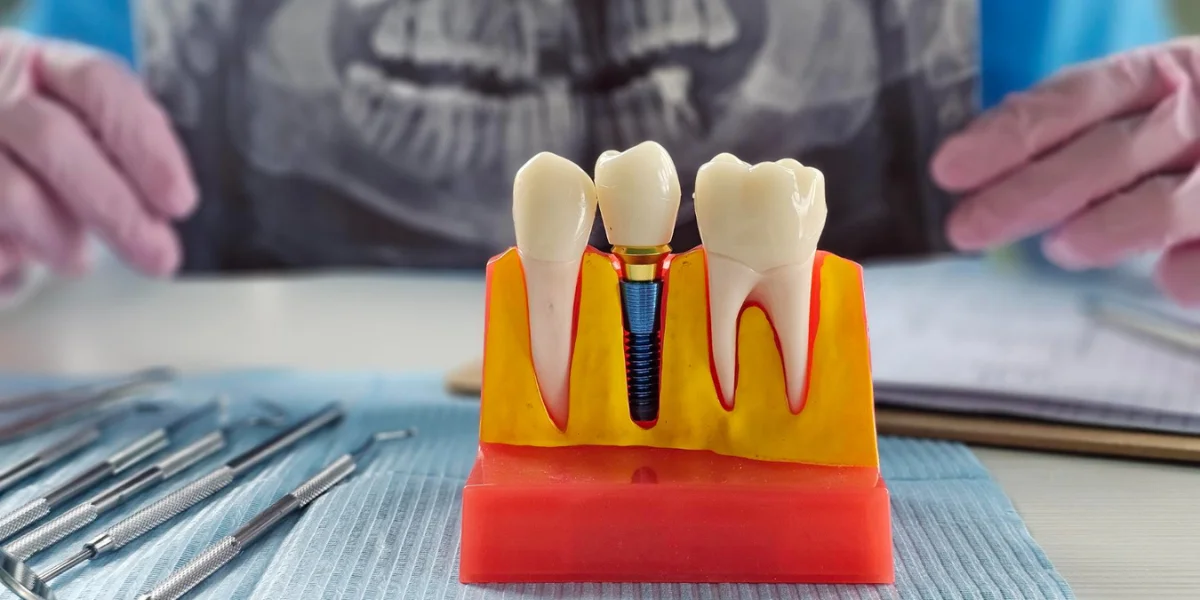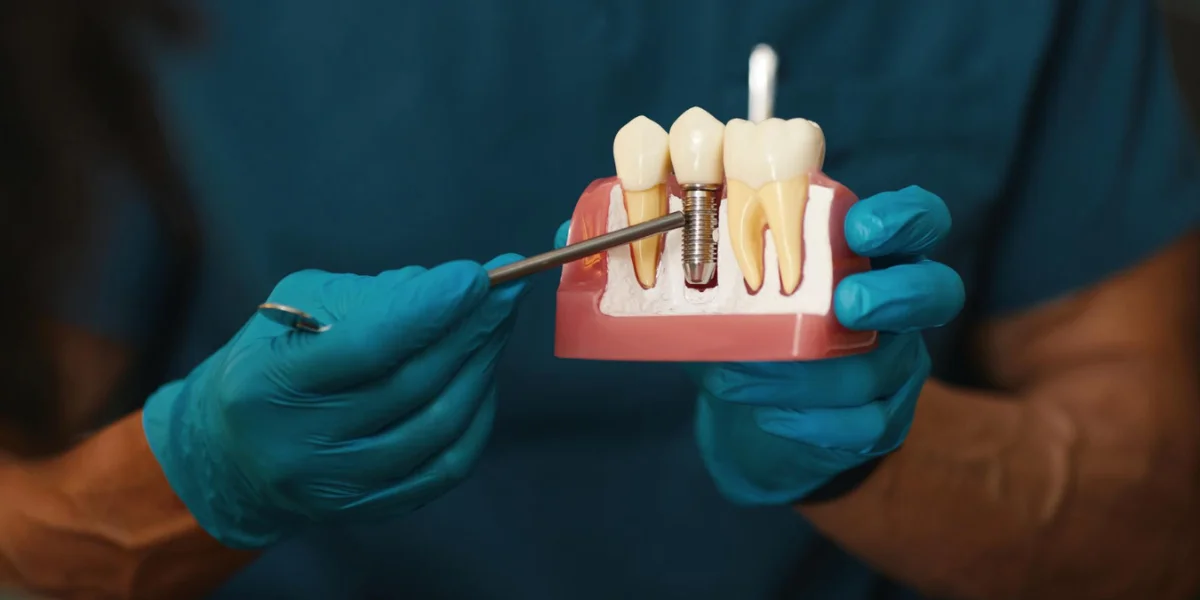Losing a tooth can be a traumatic experience, and it can have a major impact on your quality of life. Dental implants Treatment is a popular solution for people who have lost teeth, but they are often accompanied by a painful recovery process. Fortunately, there are now painless dental implants options available that can help …
Losing a tooth can be a traumatic experience, and it can have a major impact on your quality of life. Dental implants Treatment is a popular solution for people who have lost teeth, but they are often accompanied by a painful recovery process. Fortunately, there are now painless dental implants options available that can help restore your smile without the discomfort. In this post, we will cover everything you need to know about implants, including how they work, what the procedure entails, and what to expect during the recovery period. We’ll also discuss the benefits of dental implants, including improved comfort, faster healing times, and a more natural-looking smile. So if you’re considering dental implants but are hesitant due to fear of pain, read on to learn more about this innovative solution.
What are dental implants?
Dental implants are essentially artificial tooth roots that are placed into your jawbone to support a replacement tooth. They are typically made of titanium and are designed to fuse with your jawbone over time, providing a secure and long-lasting foundation for a dental restoration.
The implant itself is a small screw-shaped post that is surgically placed into the bone. Once the implant has been placed, a healing process begins in which the bone actually grows around the implant, anchoring it securely in place. This process, which is called osseointegration, typically takes several months to complete.
After the implant has fully integrated with the bone, a connector called an abutment is attached to the implant, and a dental restoration such as a crown, bridge, or denture is then attached to the abutment. The result is a natural-looking, fully functional tooth replacement that can last for many years with proper care.
The benefits of dental implants
Best Dental implants in Mumbai are one of the most popular tooth replacement options available today. There are many benefits to choosing dental implants over other options such as bridges or dentures.
Firstly, dental implants are a long-lasting solution. They are designed to be durable and can last for many years with proper care. Unlike dentures or bridges, which may need to be replaced after a few years, dental implants can last a lifetime.
Another benefit of dental implants is that they look and feel like your natural teeth. They are designed to match the color, shape, and size of your existing teeth, so they blend in perfectly. This means you can smile, eat, and speak with confidence, knowing that your replacement teeth look and feel just like your natural teeth.
Dental implants are also a more comfortable option compared to dentures, which can cause discomfort and irritation in the mouth. With dental implants, there is no need for uncomfortable adhesives or messy creams to keep them in place. Once they are implanted, they are a permanent fixture in your mouth.
One of the most significant benefits of dental implants is that they help to maintain bone density in your jaw. When you lose a tooth, the bone in your jaw can begin to deteriorate over time, which can lead to further tooth loss and a sunken appearance in your face. Dental implants help to stimulate bone growth and prevent further deterioration, ensuring your jaw remains healthy and strong.
In summary, dental implants offer a long-lasting, natural-looking, comfortable, and healthy solution for tooth replacement. If you are considering tooth replacement options, dental implants are definitely worth considering.
The types of dental implants
When it comes to dental implants, there are different types available depending on your specific needs. The most common type is the endosteal implant. This type of implant is placed in the jawbone and holds one or more artificial teeth. Endosteal implants are usually made of titanium and are the most commonly used type of implant today.
Another type of dental implant is the subperiosteal implant. This type of implant is placed above the jawbone but below the gum line. It is used for patients who do not have enough healthy jawbone to support an endosteal implant.
For patients who have lost all of their teeth, an implant-supported denture may be a good option. This type of denture is held in place by dental implants and is more stable than traditional dentures.
Zygomatic implants are long implants that use the deeper bony structures of the facial bones to support replacement teeth.
Mini dental implants are also available. These implants are smaller than traditional implants and are used for patients with less jawbone density. They are often used to support dentures or bridges.
Your dentist will recommend the best type of implant for your specific needs based on a number of factors, including the health of your jawbone and the number of teeth you need to replace. With the right type of implant, you can enjoy the benefits of a beautiful, healthy smile for years to come.
Painless dental implants: Is it possible?
When it comes to dental implants, many people worry about the pain and discomfort associated with the procedure. While it’s true that dental implants involve drilling into the bone and placing a titanium post, advances in dental technology have made the procedure virtually.
Another factor that contributes to pain control during dental implant surgery is the use of anesthesia. A skilled dental professional will use local anesthesia to numb the area where the implant will be placed, ensuring that you won’t feel any pain during the procedure. Some dental practices even offer sedation dentistry, which involves the use of medication to help you relax and remain calm during the procedure.
It’s important to note that while dental implant surgery is not completely painless, many patients report little to no pain during the procedure and minimal discomfort during the recovery period. With proper care and maintenance, dental implants can provide a long-lasting, natural-looking solution to missing teeth, and the pain associated with the procedure will be well worth the results.
Risks and complications associated with dental implant surgery
As with any medical procedure, there are risks and potential complications associated with dental implant surgery. It’s important to understand these potential risks before making a decision to undergo the procedure. Possible risks and complications of dental implant surgery include infection, nerve damage, implant failure, and bone loss. Infection can occur if the implant site isn’t kept clean, and it can lead to implant failure. Nerve damage can cause numbness or tingling in the mouth, face, or gums, and it can be temporary or permanent. Implant failure can occur if the implant doesn’t fuse properly with the bone, which can be caused by a variety of factors such as smoking, poor oral hygiene, or insufficient bone density. Bone loss can occur if the implant isn’t properly placed or if there isn’t enough bone to support the implant.
The use of high quality imaging like CBCT scans and stents are employed to make the entire process very accurate and minimize the chances of risks. It’s important to discuss these risks and potential complications with your dentist or oral surgeon before undergoing the procedure. They can help you understand your individual risk factors and develop a plan to minimize those risks. In most cases, dental implant surgery is a safe and effective procedure with a high success rate. Especially when the patients adhere to the post-surgery instructions given by the dentist. However, it’s important to be aware of the potential risks and complications so you can make an informed decision.
Aftercare for dental implants
Aftercare for dental implants is crucial to their success. The first days after the surgery are the most important. You should avoid any strenuous activity and rest as much as possible on the day of procedure. Avoid smoking as this can slow down the healing process and increase the risk of infection. You should also avoid hot drinks, spicy foods, and hard foods for the first few days after the surgery.
In addition to these precautions, it’s important to maintain good oral hygiene. Brush your teeth gently twice a day, including your dental implants. Floss around your dental implants daily to remove any food particles and plaque that may have accumulated.
Regular dental visits are also important after dental implant surgery. Your dentist will monitor the healing process and ensure that the implants are integrating properly with the bone. They can also provide advice on how to care for your dental implants and any other oral health issues that may arise.
Overall, the aftercare of dental implants is crucial to their long-term success. By following these simple steps, you can ensure that your dental implants stay healthy and functional for years to come.
We hope you found our blog post on painless dental implants informative and helpful. Dental implants are a great solution for people who are missing teeth, and if you’re considering getting them. Remember you can always consult our qualified dental professional before making any decisions about your oral health. With the proper care, dental implants can last for many years, and we wish you all the best for your perfect smile.
Tags -: Dental Implants in Mumbai, Dental Implants Mumbai, Dental Implants Treatment in Mumbai, Dental Implant in Mumbai




